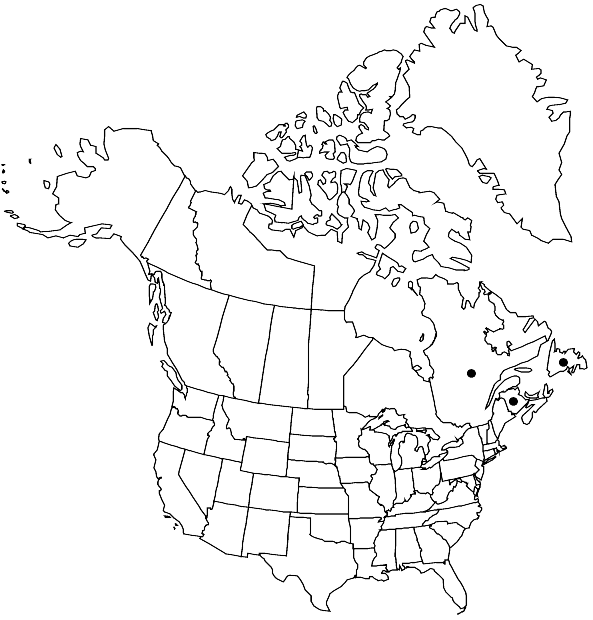Difference between revisions of "Seligeria brevifolia"
Kongl. Svenska Vetensk. Acad. Handl., n. s. 23(10): 84. 1890,.
FNA>Volume Importer |
FNA>Volume Importer |
||
| Line 23: | Line 23: | ||
|habitat=Calcareous substrates | |habitat=Calcareous substrates | ||
|distribution=N.B.;Nfld. and Labr. (Nfld.);Que.;Europe;Asia. | |distribution=N.B.;Nfld. and Labr. (Nfld.);Que.;Europe;Asia. | ||
| − | |discussion=<p>Seligeria brevifolia is known from only a few localities in Atlantic Canada. It is most closely related to S. pusilla, from which it differs by shorter, wider leaves. It is characterized also by a light green color and short, linear to narrowly lanceolate-linear leaves with a broadly acute point. The leaf cells are pellucid and rectangular to quadrate. The setae are slightly flexuose when moist; the capsules are obovate and gradually narrowed to the seta. When old and dry, the capsules are widest at the mouth. The peristome is reddish, smooth, recurved, and long, usually extending along the capsule about 1/4 way.</p> | + | |discussion=<p><i>Seligeria brevifolia</i> is known from only a few localities in Atlantic Canada. It is most closely related to <i>S. pusilla</i>, from which it differs by shorter, wider leaves. It is characterized also by a light green color and short, linear to narrowly lanceolate-linear leaves with a broadly acute point. The leaf cells are pellucid and rectangular to quadrate. The setae are slightly flexuose when moist; the capsules are obovate and gradually narrowed to the seta. When old and dry, the capsules are widest at the mouth. The peristome is reddish, smooth, recurved, and long, usually extending along the capsule about 1/4 way.</p> |
|tables= | |tables= | ||
|references= | |references= | ||
| Line 45: | Line 45: | ||
|publication year= | |publication year= | ||
|special status= | |special status= | ||
| − | |source xml=https://jpend@bitbucket.org/aafc-mbb/fna-data-curation.git/src/ | + | |source xml=https://jpend@bitbucket.org/aafc-mbb/fna-data-curation.git/src/8f726806613d60c220dc4493de13607dd3150896/coarse_grained_fna_xml/V27/V27_440.xml |
|genus=Seligeria | |genus=Seligeria | ||
|species=Seligeria brevifolia | |species=Seligeria brevifolia | ||
Revision as of 16:55, 18 September 2019
Plants delicate, light green. Leaves linear to lanceolate-linear, gradually narrowed, broadly acute, costae ending just below apex; margins entire, leaf cells (1–)3:1; perichaetial leaves longer, but otherwise similar to vegetative leaves, not much differentiated. Seta 1.8–2.2 mm, straight to flexuose, slender. Capsule obovate to oblong, longer than wide, broadest at mouth when old; peristome of 16, long, well-developed teeth; columella immersed. Spores 10–12 µm.
Habitat: Calcareous substrates
Distribution

N.B., Nfld. and Labr. (Nfld.), Que., Europe, Asia.
Discussion
Seligeria brevifolia is known from only a few localities in Atlantic Canada. It is most closely related to S. pusilla, from which it differs by shorter, wider leaves. It is characterized also by a light green color and short, linear to narrowly lanceolate-linear leaves with a broadly acute point. The leaf cells are pellucid and rectangular to quadrate. The setae are slightly flexuose when moist; the capsules are obovate and gradually narrowed to the seta. When old and dry, the capsules are widest at the mouth. The peristome is reddish, smooth, recurved, and long, usually extending along the capsule about 1/4 way.
Selected References
None.